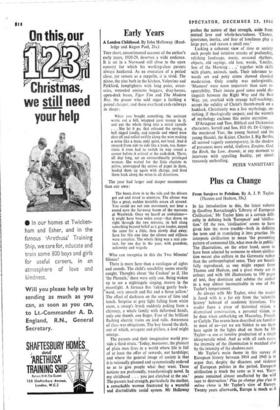Early Years
This short, unsentimental account of the author's early years, 1920-29, deserves a wide audience. It is set ha a Norwood still close to the open country for which his working-class parents always hankered. As an evocation of a period close, yet remote as a zeppelin, it is vivid. The piano, the zinc bath in the kitchen, Valentino and Pickford, lamplighters with long poles, street- cries, wounded ominous beggars, dray-horses, open-deck buses, Tiger Tim and The Modern Boy, the grocer who sold sugar a farthing a pound cheaper, and those overhead cash-railways in shops:
When you bought something, the assistant wrote out a bill, wrapped your money in it, and put the whole thing into a metal capsule . . . She let it go, that released the spring, a bell tinged loudly, and capsule and wheel were shot off and rolled swiftly along the wire making a noise like a tram, only quiet, not loud. And it swayed from side to side like a tram, too. Some- times it even had to switch its way round a corner before it arrived at the cash-desk. There, all day long, sat an extraordinarily privileged woman. She waited for the little chariots to arrive, unwrapped the screws of paper in them, loaded them up again with change, and fired them back along the wires in all directions.
The year had larger and deeper monuments than our own : The buses drew in to the side and the drivers got out and stood to attention. The silence was like a great, sudden invisible ocean all around. You could see not one movement, nor hear a sound save the far-away boom of the maroons at Woolwich. Once we heard an ambulance— it might have been miles away—that drove on right through the two minutes, its bell clang something beyond belief as it grew louder, stayed the same for a little, then slowly died away. Save for this one time the silence and stillness were complete. The whole thing was a real con- tact, for one day in the year, with grandeur, solemnity and tragedy.
Who can recognise in this the Two Minutes' Silence?
There is more here than a catalogue of sights and sounds. The child's sensibility seems exactly caught. Thoughts about 'the Cuckoo' as if, like 'the Phoenix,' there were only one. Being woken up to see a nightingale singing, mauve in the moonlight. A furnace fire `raking gently back- ward, very smooth and flat and a fierce yellow.' The effect of darkness on the sense of time and touch. Surprise at grey light falling from white snow, a sweep's brush suddenly poking from a chimney, a whole family with deformed hands, only one thumb, one finger. Fear of the brilliant flashing electric trains on iced rails. Awareness of class was ubiquitous. The boy feared the dark, out of which, arrogant and pitiless, a lord might emerge.
The parents and their imaginative world pro- vide a third strata. 'Today, moreover, the plainest of plain men lives in a world where life is full of at least the offer of rewards, not hardships; and where the general image of society is that it is rationally planned and systematically ordered so as to give people what they want. These notions are profoundly, transformingly novel. In my childhood . . . you just clutched at the sea.' The parents had strength, particularly the mother, a remarkable woman frustrated by a wasteful and discreditable social system. Mr Holloway probes the nature of that strength, aside from mutual love and whole-heartedness. 'Chance, ignorance, inertia, and fear of loneliness play a large part, and reason a small one.'
Lacking a coherent view of time or society such people had intuitive streaks of profundity, relishing landscape, music, seasonal rhythms, objects, old sayings, old lore, words, 'Lucifer, Son of the Morning . . together with skills with plants, animals, tools. Their tolerance to- wards sex and petty crime showed classical moderation. Only cruelty was unforgivable. `Manners' were more important than cant re- spectability. Their innate good sense could dis- tinguish between the Right Way and the Best Way, yet, overlaid with strange half-teachings, accept the validity of Christ's thumb-mark on a haddock. Christianity was a live mythology, en- riching, if theologically suspect, and the warmth of mythology encloses this entire narrative.
D'Artagnan and Tess, Biblical and Dickensian characters, Sorrell and Son, Hill 60, Dr Crippen, the murdered Tsar, the young Samuel and the young Handel, the Kaiser, Charles I, Big Bertha, all seemed vaguely contemporary, in the shadow of presences more awful, Gallows, Empire, God, the Birch, the Law, Arsenic, at any moment to intervene with appalling finality, yet simul- taneously enthralling.
PETER VANSITTART






























 Previous page
Previous page